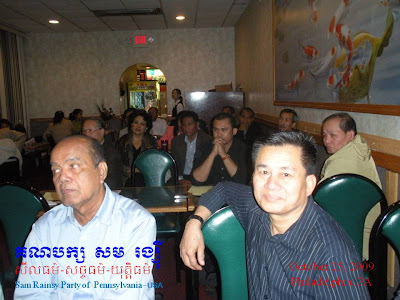 Orphaned Cambodian children in refugee camp in 1979
Orphaned Cambodian children in refugee camp in 1979
 Young Somaly Lun
Young Somaly Lun
 Somaly as she is today
Somaly as she is today
 With her daughters (All pics: Harry Page, Getty)
With her daughters (All pics: Harry Page, Getty)
It is 30 years since John Pilger revealed the existence of the Cambodian Killing Fields in the Daily Mirror. For Somaly Lun, the anniversary is bittersweet.
Today, customers at the Oxfordshire supermarket checkout where she works have no idea of her extraordinary story.
How she escaped US B-52 bombers as a child, a Khmer Rouge concentration camp as a teenager, and Vietnamese soldiers as a young woman. How she lost her father and six brothers to the Khmer Rouge.
Somaly owes her life in the UK to Oxfam's Marcus Thompson, then a young humanitarian worker who had become friends with Somaly and her husband Borithy.
"England gave me the first safe place I had ever lived," Somaly says.
By the time she was 10, her home town of Kratie was under attack, even though Cambodia was neutral. Kratie was close to the border with Vietnam which was at war with the States, and US President Richard Nixon ordered 100,000 tonnes of secret bombings.
"The B-52s came every day," Somaly recalls. "Every day, shooting and bombing and running." One day a man grabbed her as an F-11 US fighter jet swept low and held her in front of him as a shield. "The plane was so low I could almost see the pilot's face," she says. It permanently damaged her hearing.
Somaly's family fled to Phnom Penh, but by 1975 it had fallen to Pol Pot's Khmer Rouge. Backed by the US against the Vietnamese communists, the Khmer Rouge were determined to return Cambodia to Year Zero, to a time before industrialisation.
"My father, a doctor, was in the middle of an operation the day the Khmer Rouge came," Somaly says. "He said, 'What about the patient?' They pointed a gun at him and asked, 'Do you want to die?'"
Somaly's family were herded out at gunpoint with two million other people. The family was taken to Pursat, a concentration camp in the remote countryside. Then the Khmer Rouge came for Somaly's father.
"They said, 'We know you are a doctor'." The first time, they wanted him to treat one of the leaders. But the second time, "they took him away and he never came back". Somaly was forced to spend 20 hours a day as a slave doing hard labour in the rice fields despite starvation, exhaustion and malaria.
Her older brother was caught saving his food rations for her. "They made him confess he was a US spy," she says. "They kept beating him until he died. Then my younger brother was taken. They put him in a prison with other children, and burned it to the ground. The screams have haunted me ever since.
"One day, they came and took 2,000 people. One of the girls came back like a zombie with blood all over her. She said, 'They killed everyone'." Then, one day a pal whispered: "They are killing our parents and we have to escape now, tonight." Somaly says: "After dark we went to where people were gathered with three big boats."
The Khmer Rouge chased them along the river, firing at the boats. She says: "We hid in the mangrove and caught fish and ate it raw as we didn't dare to make a fire. We drank muddy water. We all became sick - just skin and bones."
Everyone on Somaly's boat was drifting in and out of consciousness. "But somehow it arrived by itself at Kampong Chhnang, where the Khmer Rouge was driven out," she says. "They gave us food, water, shelter."
Advertisement - article continues below »
New escapees from Pursat told Somaly that thousands had been taken to a cliff and forced off at gunpoint. Yet, somehow her mother, sister and brother had escaped. "The day I saw them again was the happiest day of my life," Somaly says.
When they returned to Phnom Penh in 1979 they found a ghost city occupied by the Vietnamese liberators.
Somaly took a job at the hotel Samaki - now Le Royale - as a receptionist, where she met Borithy, who was working for the Cambodian foreign office as a translator.
She also met Marcus Thompson, a 34-year-old British aid worker sent by Oxfam to set up a humanitarian programme. "We became friends," he remembers. "We were all stuck together at the hotel."
But Cambodia was still dangerous - and Borithy was warned to leave Phnom Penh. "He said he was in love with me and refused to leave without me," Somaly says.
On March 16, 1980, the couple married in secret inside a destroyed pagoda. The next day, they escaped. Passing through fields of landmines, they made it through Vietnamese, then Khmer Rouge territory and even past the Thai border guards to Khao I Dang, a squalid refugee camp on the border. Somaly wrote to her family and to Marcus to tell them they were alive.
"I needed to go to those camps as part of my work," Marcus says. Somaly says she will never forget seeing Marcus walking through the camp. "I cried out 'Marcus!' and just hung on to his neck," she says.
Marcus was shocked by their plight. "They couldn't go back to Cambodia," he says. "The Thais wouldn't accept them. We had to do something."
Back in England, Marcus and his Oxfam colleagues went through official channels to ask whether Britain would accept the family as refugees.
"We had no expectation anything would happen," Marcus says. "But then we got a letter saying 'Yes'."
Somaly, 22 and pregnant, arrived in the UK on May 12, 1981, with Borithy, Somaly's mother Moeun, brother Rithy and sister Virak - and settled close to Marcus and his family in Witney, Oxfordshire.
"People at the Oxfam offices donated all kinds of furniture, saucepans, an old TV, carpets," Somaly remembers.
Today, the couple's daughters are success stories in their own right. The youngest, 23-year-old Bophanie, is a teacher in Brighton, while her sister, Mary Thida Lun, 27, is Assistant Private Secretary to the Minister of State for International Development, Gareth Thomas.
At 64, Marcus still works as an adviser to Oxfam, and the charity remains working in Cambodia, still tackling the legacy of the dark days of the Khmer Rouge and facing new challenges from climate change, typhoons and flooding.
Today, 30 years on, when she goes to and from work at the local supermarket, living her British life, Somaly sometimes remembers the words her father said to her before they took him away.
"He said, 'You are going to survive. You are going to go places'." She shakes her head slowly. "I think that was what gave me the strength to survive."
Read More . !
File l
Image l
More














 Policemen stand guard outside the Cambodian Embassy during a demonstration in Bangkok October 27, 2009. The relationship between Thailand and Cambodia, which is already stressed from a border dispute near Preah Vihear temple, was further worsened after comments made by Cambodian Prime Minister Hun Sen about exiled former Thai Prime Minister Thaksin Shinawatra. Hun Sen offered Shinawatra at the ASEAN summit last week, a job as economic adviser should he choose to seek asylum in Cambodia. REUTERS/Chaiwat Subprasom
Policemen stand guard outside the Cambodian Embassy during a demonstration in Bangkok October 27, 2009. The relationship between Thailand and Cambodia, which is already stressed from a border dispute near Preah Vihear temple, was further worsened after comments made by Cambodian Prime Minister Hun Sen about exiled former Thai Prime Minister Thaksin Shinawatra. Hun Sen offered Shinawatra at the ASEAN summit last week, a job as economic adviser should he choose to seek asylum in Cambodia. REUTERS/Chaiwat Subprasom Policemen stand guard outside the Cambodian Embassy during a demonstration in Bangkok October 27, 2009. The relationship between Thailand and Cambodia, which is already stressed from a border dispute near Preah Vihear temple, was further worsened after comments made by Cambodian Prime Minister Hun Sen about exiled former Thai Prime Minister Thaksin Shinawatra. Hun Sen offered Shinawatra at the ASEAN summit last week, a job as economic adviser should he choose to seek asylum in Cambodia. REUTERS/Chaiwat Subprasom
Policemen stand guard outside the Cambodian Embassy during a demonstration in Bangkok October 27, 2009. The relationship between Thailand and Cambodia, which is already stressed from a border dispute near Preah Vihear temple, was further worsened after comments made by Cambodian Prime Minister Hun Sen about exiled former Thai Prime Minister Thaksin Shinawatra. Hun Sen offered Shinawatra at the ASEAN summit last week, a job as economic adviser should he choose to seek asylum in Cambodia. REUTERS/Chaiwat Subprasom Thai police officers stand guards as the security is tightened outside the Cambodian Embassy in Bangkok, Thailand, Tuesday, Oct. 27, 2009 for ongoing rallies by Thai protestors. Cambodian Prime Minister Hun Sen offered to make Thailand's ousted Prime Minister Thaksin Shinawatra his economic adviser last week, threatening to worsen already tense relations between the two Southeast Asian neighbors. (AP Photo/Apichart Weerawong)
Thai police officers stand guards as the security is tightened outside the Cambodian Embassy in Bangkok, Thailand, Tuesday, Oct. 27, 2009 for ongoing rallies by Thai protestors. Cambodian Prime Minister Hun Sen offered to make Thailand's ousted Prime Minister Thaksin Shinawatra his economic adviser last week, threatening to worsen already tense relations between the two Southeast Asian neighbors. (AP Photo/Apichart Weerawong) Thai activists wave Thai flags and chant slogans during a rally against the act of Cambodian Prime Minister Hun Sen toward Thailand outside the Cambodian Embassy in Bangkok, Thailand, Tuesday, Oct. 27, 2009. Hun Sen offered to make Thailand's ousted Prime Minister Thaksin Shinawatra his economic adviser last week, threatening to worsen already tense relations between the two Southeast Asian neighbors. (AP Photo/Apichart Weerawong)
Thai activists wave Thai flags and chant slogans during a rally against the act of Cambodian Prime Minister Hun Sen toward Thailand outside the Cambodian Embassy in Bangkok, Thailand, Tuesday, Oct. 27, 2009. Hun Sen offered to make Thailand's ousted Prime Minister Thaksin Shinawatra his economic adviser last week, threatening to worsen already tense relations between the two Southeast Asian neighbors. (AP Photo/Apichart Weerawong) Thai activists set fire a protest placard that represents the treaty between Siam (old name of Thailand) and France during a rally against the act of Cambodian Prime Minister Hun Sen toward Thailand outside the Cambodian Embassy in Bangkok, Thailand Tuesday, Oct. 27, 2009. Hun Sen offered to make Thailand's ousted Prime Minister Thaksin Shinawatra his economic adviser last week, threatening to worsen already tense relations between the two Southeast Asian neighbors. (AP Photo/Apichart Weerawong)
Thai activists set fire a protest placard that represents the treaty between Siam (old name of Thailand) and France during a rally against the act of Cambodian Prime Minister Hun Sen toward Thailand outside the Cambodian Embassy in Bangkok, Thailand Tuesday, Oct. 27, 2009. Hun Sen offered to make Thailand's ousted Prime Minister Thaksin Shinawatra his economic adviser last week, threatening to worsen already tense relations between the two Southeast Asian neighbors. (AP Photo/Apichart Weerawong) 
 Young Somaly Lun
Young Somaly Lun Somaly as she is today
Somaly as she is today With her daughters (All pics: Harry Page, Getty)
With her daughters (All pics: Harry Page, Getty)





